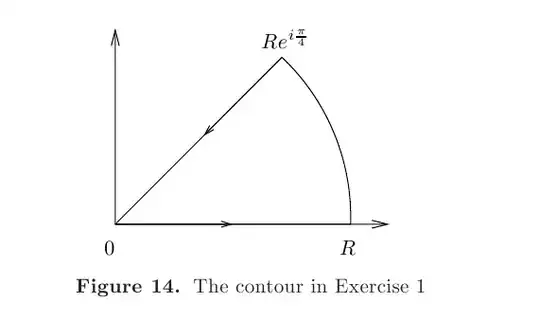I am supposed, in an exercise, to calculate the above integral by integrating $f(z) = e^{-z^{2}}$ on the following countor: 
I began by separating the path $\gamma$ into three paths (obvious from the picture), and parametrizing each as follows:
$\gamma_{1} : [0, R] \rightarrow \mathbb{C}$ with $\gamma_{1}(t) = t$
$\gamma_{2} : [0, \frac{\pi}{4}] \rightarrow \mathbb{C}$ with $\gamma_{2}(t) = Re^{it}$
$\gamma_{3} : [0, \frac{\sqrt{2}R}{2}] \rightarrow \mathbb{C}$ with $\gamma_{3}^{-}(t) = t + it$ (with reverse orientation).
Then we can say that $\displaystyle\int_{\gamma} f(z) dz = \displaystyle\int_{\gamma_{1}} f(z) dz + \displaystyle\int_{\gamma_{2}} f(z) dz - \displaystyle\int_{\gamma_{3}^{-}} f(z) dz = 0$ since the path is closed.
Now $\displaystyle\int_{\gamma_{1}} f(z) dz = \displaystyle\int\limits_{0}^{R} e^{-t^{2}} dt$. We also get $\displaystyle\int_{\gamma_{3}^{-}} f(z) dz = -(i + 1) \displaystyle\int\limits_{0}^{\frac{\sqrt{2}R}{2}}e^{-2it^{2}} dt$. After playing around with sine and cosine a bunch to evaluate that last integral, I get:
$$0 = \int\limits_{0}^{R} e^{-t^{2}} dt + \int\limits_{\gamma_{2}} f(z) dz - \frac{i + 1}{\sqrt{2}} \int\limits_{0}^{R} \cos(u^{2}) du + \frac{i - 1}{\sqrt{2}} \int\limits_{0}^{R} \sin(u^{2}) du$$
I could not evaluate the integral along the second path, but I thought it might tend to 0 as $R \rightarrow \infty$. Then taking limits and equating real parts we get
$$\frac{\sqrt{2 \pi}}{2} = \displaystyle\int\limits_{0}^{\infty} \sin(u^{2}) du + \displaystyle\int\limits_{0}^{\infty} \cos(u^{2}) du$$
If I could argue that the integrals are equal, I would have my result.. But how do I?
So I need to justify two things: why the integral along $\gamma_{2}$ tends to zero and why are the last two integrals equal.
$$\int\limits_0^\infty {\sin \left( {a{x^2}} \right)\cos \left( {2bx} \right)dx} = \sqrt {\frac{\pi }{{8a}}} \left( {\cos \frac{{{b^2}}}{a} - \sin \frac{{{b^2}}}{a}} \right)$$
$$\int\limits_0^\infty {\cos \left( {a{x^2}} \right)\cos \left( {2bx} \right)dx} = \sqrt {\frac{\pi }{{8a}}} \left( {\cos \frac{{{b^2}}}{a} + \sin \frac{{{b^2}}}{a}} \right)$$
– Pedro Apr 04 '12 at 02:41